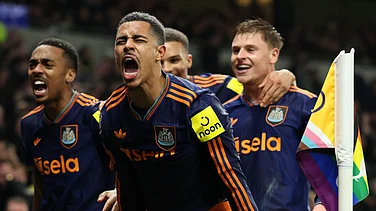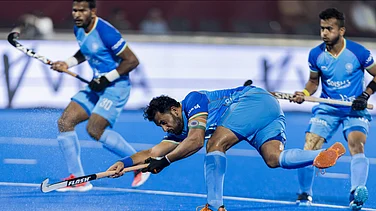(Note: This story was originally published in November 2022 and is being replugged now in light of recent developments in Pakistan)
Cricket is part and parcel of the India-Pakistan diplomatic toolkit, used by successive governments to reflect the state of political relations between the two countries. With ties between the two in deep freeze since 2016, matches are played in neutral venues and bilateral visits are off the table. Yet cricket has, in the past, helped to break the ice and lead to an overall easing of tension.
No one can forget late Prime Minister, Atal Behari Vajpayee’s, advice to captain, Sourav Ganguly, and the Indian team when they called on him before a path-breaking visit to Pakistan in 2004. “Khel hi nahin, dil bhi jeetiye, shubhkaamnaye” (Win hearts too besides matches). Vajpayee, who was keen on reviving talks with Pakistan, had written on a bat he presented to the team. The visit was controversial, as many within the BJP opposed it. Former home minister, L. K Advani, fought tooth and nail to scuttle the ODI and test series.
Sports diplomacy is not confined to the subcontinent but is prevalent across the world. Since Russian President Vladimir Putin ordered his military to invade Ukraine, Russian athletes are being shut out of all Western international sport. The International Olympic Committee had asked sports federations to exclude Russian and Belarusian (for helping Moscow) players and officials from international events. The Russian team is out of the football World Cup and the club, Spartak Moscow, was thrown out of the Europa League. South African sportsmen were banned from all international competitions during apartheid.
But sporting events also led to major breakthroughs in relations between sworn enemies. A prime example is the ping-pong diplomacy between China and the US. In April 1971, nine players from the US table tennis team visited China and became the first Us delegation to visit the Communist nation. In fact, after the 1949 Communist revolution, China and the US had no diplomatic ties. This was a bolt from the blue for the US, as for the rest of the world, as no one knew yet about the secret moves that were being made for Henry Kissinger, the then US secretary of state to visit Beijing in July that year. Kissinger’s hush-hush trip was preceded by the table tennis players. Next year in 1972, President Richard Nixon met Mao Zedong in Beijing and the rest is history.

Nothing so dramatic has happened between India and Pakistan. After the 2008 Mumbai terror attack, India decidedly cooled towards Pakistan. Yet there have been attempts from time to time, even after the Mumbai attacks, to normalise ties. The last attempt by Prime Minister, Narendra Modi, was when he stopped over for an unscheduled visit in Lahore to greet then Prime Minister of Pakistan, Nawaz Sharif, on his birthday. The PM was on an official visit to Kabul. The attack on India’s frontline airbase in Pathankot, followed by a strike on a Brigade Headquarters in Uri, ended all attempts at peace-making. The 2019 car bomb blast in Pulwama, where nearly forty Indian security personnel were killed further hardened India’s stand.
At the moment, there is another flashpoint in cricketing ties between the two sub-continental neighbours. Jay Shah, secretary of the Board of Control for Cricket in India (BCCI), announced recently that the Indian team would not travel to Pakistan where the Asia Cup is scheduled to be held next year. Pakistan hit back by saying that it will pull out of the ODI World Cup to be played in India in 2023. Roger Binny, the new BCCI chief, was quoted as saying, “That isn’t our call. We can’t say where our team has to go. We need to take clearance from the government if we leave the country, or if other countries come here. We can’t take that decision on our own, we’ve to rely on the government.”
No cricket board in India can take that call. Matches to be played in Pakistan have to get security as well as political clearance from the government and intelligence agencies. Cricket has always been held hostage to political ties and most people in both countries are reconciled to that. It is not up to the cricket boards but the political leaders to take a decision in such matters.

In January 1999, the Shiv Sena had played spoiler during a visit by the Pakistan cricket team. Balasaheb Thackeray was then alive and was virulently anti-Pakistan. He was outraged that the Pakistan team was to tour India and asked Shiv sainiks to dig up the Ferozeshah Kotla pitch ahead of the match. That match had to be abandoned. The visitors then flew to Chennai for the next match with India and got a rousing welcome from cricket lovers in the stadium.
Yet again, cricket has also sometimes been used to diffuse tension. This happened in 1987, when military dictator, Zia-ul Haq, was President of Pakistan and Rajiv Gandhi was Prime Minister of India. New Delhi had launched one of the biggest war games in the Thar desert in Rajasthan, near the Pakistan border. It was named Brasstacks and was to prepare the Indian army for deep penetration strikes inside enemy territory. It began in November 1986 and ended in March 87, lasting around five months. The exercises naturally rang alarm bells in Islamabad and Rawalpindi. Pakistan too amassed troops on the border to meet the Indian ‘threat’. Tension between India and Pakistan mounted and international focus was on India, as Pakistan, then a great friend of the US, and the West in general, had alerted the international community. There was talk of another war between India and Pakistan.
President Zia decided to ease the situation by flying into India to watch an India-Pakistan match being played in Jaipur. He arrived with a large delegation of 68 government officials, sportspersons, and family members. He landed in Delhi a day before the Jaipur fixture and held an hour of talks with Rajiv Gandhi, where he is said to have informed the Indian leader that Pakistan had a nuclear bomb. Though Indian officials played down the visit and said it was a courtesy call as the President had come to Delhi, it did help to clear the air.

Gen Zia told reporters, “Cricket for peace is my mission, and I have come with that spirit.” A war was averted. This was the first time that cricket diplomacy was effectively used in the India-Pakistan context. There have been many more since.
Vajpayee’s attempts to broker peace by sending an Indian cricket team to Pakistan have already been mentioned. Islamabad issued 20,000 visas to Indian cricket fans to watch the games that year. It helped to generate plenty of goodwill on both sides of the border. General Pervez Musharraf visited India in April 2005 to watch an India-Pakistan match. This was at the invitation of then Prime Minister, Manmohan Singh.
During the World Cup 2011’s semi-final clash between India and Pakistan, Singh asked Prime Minister, Yousuf Raza Gilani, to watch the match with him in Mohali. Both countries used cricket whenever there is the need to make a political overture. After Gilani’s visit, the situation improved and Pakistan toured India from Christmas day, 2012, till early January 2013, and played a couple of one-day matches and T-20s. That was the last bilateral visit of a Pakistani team to India. Whether there will be any more in the near future is open to question. The mood in the government does not give much hope.

Bilateral relations between nations are not based on sporting ties. Sports can be used for diplomacy as a tool, nothing more. Diplomats of both India and Pakistan agree that cricket cannot break barriers unless there is political will.
Salman Bashir, former Foreign Secretary of Pakistan, who was also High Commissioner to India, did not see much hope of any breakthrough in relations between the two countries. “Nothing seems to work, including cricket. Pakistan is trying to sort out its own political problems. Maybe all of this will matter (diplomacy through cricket), but not at the moment.”
T.C.A Raghavan, India’s former High Commissioner to Pakistan, said: “India-Pakistan matches are great cricketing contests and should be enjoyed as such. Certainly, if and when bilateral India-Pakistan matches resume it will indicate greater stability in the relations but to expect cricket to have a political or diplomatic role as such is unrealistic.”
ALSO READ: An Enigma Called Imran Khan
(This appeared in the print edition as "Run Out")



























